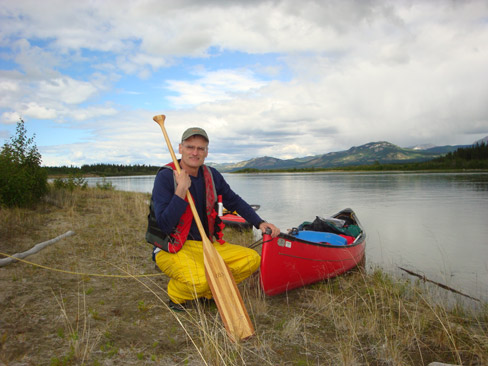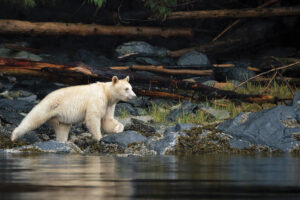
People & Culture
Kahkiihtwaam ee-pee-kiiweehtataahk: Bringing it back home again
The story of how a critically endangered Indigenous language can be saved
- 6310 words
- 26 minutes
This article is over 5 years old and may contain outdated information.
People & Culture

The wind was howling and dark clouds hung low on the hills. I had just paddled through an area about 30 km long where a forest fire had recently devastated the land. It was shocking! An eerie gloom hung over the skeletal forest that remained with blackened trunks pointing at the sky. My mood was low enough without the dark clouds and high winds. Then it started raining. Yuck!
As the weather deteriorated (high winds and more rain) I found a miserable slough “owned” by a beaver — a muddy and gooey area with low alder. This little bit of awful real estate was prime bear country.
Loneliness and hopelessness just flooded through me. Home and family dominated my mind. I felt totally cut off from the living, from civilization.

“So this is the taste of adventure,” I thought to myself, shaking. “It’s more tasty from the perspective of a home fireplace and a mug of hot tea.”
The rain and wind quickened. I dug out a tarp from my gear, covered my canoe and pulled it over me too. Then I lay down in the canoe with the tarp over top. Like a lullaby, the gently splattering of rain made me fall asleep in minutes. I woke up three quarters of an hour later and felt much better. It was still raining, but the wind had disappeared.
I set out again for the village of Carmacks, Y.T., 30 kilometres away downriver. The thought of hot showers and a hamburger drew me onwards through the cold rain that ran down my arms with each stroke.

When Carmacks finally drew in view, I almost yelped with glee!
That was a few days ago. Now the Yukon River is in full flood, and I’m clocking speeds of up to 18 kilometres per hour, hardly dipping my paddle. Consequently, there are few gravel bars to camp on. This makes camping a real challenge. And trying to land at a potential site can prove very difficult!
Two nights ago I paddled 67 kilometres (averaging 10 kilometres per hour) without seeing a single place to camp. Finally, my luck held and I found a great spot in an eddy. This made it easier to land. I set up my tent quickly, ate supper and fell asleep. Next morning I noticed the tree beside my tent (less than a metre away) had several long, deep claw marks from a bear. That was a bit exciting! This is definitely bear country — black as well as grizzly.

Yesterday a river guide advised me that Five Finger Rapids, because of the high flood rates, is swamping a number of canoes. The haystacks are as high as two metres, with lots of cross currents. Not nice. He advised me to portage around them, as some other people are doing. I was planning to run the rapids, but not two-metre-high waves. That’s too dangerous when I’m alone. The water is icy.
Well I’ve just had a shower (was that an angel choir I heard singing?!) — my first cleaning in eight days of river travel — and I’m back on the river tomorrow alone again. The silence and tranquility are astonishing. I’m hoping to get to Yukon Crossing ghost town after running Rink Rapids. Now that I’m clean again I wonder if the mosquitoes will have more appetite. I’ve been bitten so far about 127 times.
When Yukoners talk about an air show, they mean something different than most other people.
This is such amazingly beautiful land. You haven’t travelled Canada until you’ve seen the North!
Allen Macartney is completing a solo trip on the Yukon River to retrace the route of prospectors in the days of the Klondike gold rush. Read more of his blog posts and learn about his Royal Canadian Geographical Society-funded expedition.
Are you passionate about Canadian geography?
You can support Canadian Geographic in 3 ways:

People & Culture
The story of how a critically endangered Indigenous language can be saved

People & Culture
Indigenous knowledge allowed ecosystems to thrive for millennia — and now it’s finally being recognized as integral in solving the world’s biodiversity crisis. What part did it play in COP15?

Wildlife
How ‘maas ol, the spirit bear, connects us to the last glacial maximum of the Pacific Northwest

Places
In Banff National Park, Alberta, as in protected areas across the country, managers find it difficult to balance the desire of people to experience wilderness with an imperative to conserve it